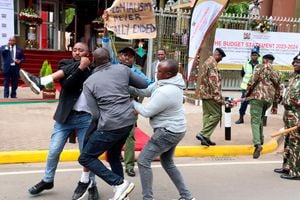Intra-Africa trade should be a priority as Raila campaigns for AUC top post

Azimio la Umoja leader Raila Odinga.
What you need to know:
- Are we about to witness a sea change under the possible AUC chairmanship of Raila Odinga?
- We've even tried to redefine our regional blocs and bodies' stated roles and operational repertoire.
Former Prime Minister Raila Odinga, 79, is a man on the cusp. Having built a name as a veteran opposition figure in Kenya, he's also earned pan-Africanist credentials, including recently, when he served as head of the agency in the African Union system that concerns itself with the continent's infrastructural development.
As a frontrunner in the race for the African Union Commission Chairperson (the post falls vacant in February next year), however, Mr Odinga potentially confronts a myriad challenges ranging from both national and regional security, peace and stability to industrialisation and the oft-underexplored intra-Africa trade. The focus of this article, though, is the latter concern.
Not long ago, African leaders were in South Korea for the Korea-Africa Summit. It was not the first such summit involving leaders from around the continent of Africa and the leadership of an economic giant in either Europe or Asia.
In fact, as I write this, the latest edition of the China-Africa Summit is slated to go down this week. Ostensibly, such summits are aimed at strengthening trade ties between Africa and the host country. These, however, bring into sharp focus the role of regional blocs.
For far too long, Africans have been talking up the need to evolve “African solutions to African problems”! Does South Korea, for instance, treat Africa as one country with which to discuss and strike bilateral trade deals? Some critics of such summits observe, for instance, that the Gross Domestic Product (GDP) of Burundi is but a fraction of the GDP of one of China's grand cities, say Beijing.
Volumes of intra-Africa trade
The Democratic Republic of Congo, Africa's fourth most populous country, is said to be endowed with mineral deposits worth US$24 trillion. Have we incentivised such in terms of both market and mineral wealth?
Europe has the European Union (EU), which, among other things, lubricates trade ties between and among European countries. Does the African Union (AU), our equivalent of the same, do that? Are we about to witness a sea change under the possible AUC chairmanship of Raila Odinga?
Can anyone even quantify the volumes of intra-Africa trade? Have we tried trade between and among African countries before seeking the help of outsiders? Why have trading blocs that woefully underdeliver on their raison d'etre? We've even tried to redefine our regional blocs and bodies' stated roles and operational repertoire.
For instance, following the military coup that saw the dethronement of Niger's then-President Mohamed Bazoum last year, to which the regional bloc, Ecowas (Economic Community of West African States), reacted with threats of “possible use of force to restore democracy”, the role and significance of such bodies — particularly on the African continent — were brought into sharp focus.
Aside from Ecowas, which was established through the Treaty of Lagos on May 28, 1975, Africa has other regional blocs such as the Southern African Development Community (SADC), established on April 1, 1980; the now-expanded East African Community (EAC), first formed in 1967, with headquarters in Arusha, Tanzania; and the Common Market for Eastern and Southern Africa (Comesa), formed in December 1994.
Mr Baraza is a writer and historian based in Nairobi. [email protected]





